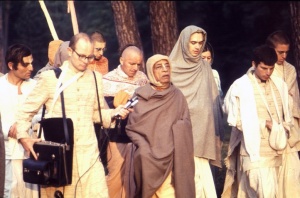SB 10.71.3: Difference between revisions
m (1 revision(s)) |
No edit summary |
||
| Line 1: | Line 1: | ||
{{info | {{info | ||
|speaker= | |speaker=Uddhava | ||
|listener= | |listener=Lord Kṛṣṇa the Supreme Personality of Godhead | ||
}} | }} | ||
[[Category:Srimad-Bhagavatam - Canto 10 Chapter 71|s03]] | |||
[[Category:Bhagavatam Verses Spoken by Uddhava - Vanisource|107103]] | |||
<div style="float:left">'''[[Srimad-Bhagavatam]] - [[SB 10|Tenth Canto]] - [[SB 10.71: The Lord Travels to Indraprastha|Chapter 71: The Lord Travels to Indraprastha]]'''</div> | |||
<div style="float:right">[[File:Go-previous.png|link=SB 10.71.2]] '''[[SB 10.71.2]] - [[SB 10.71.4]]''' [[File:Go-next.png|link=SB 10.71.4]]</div> | |||
{{RandomImage}} | |||
{{SBnotice}} | |||
==== TEXT 3 ==== | ==== TEXT 3 ==== | ||
<div | <div class="verse"> | ||
yaṣṭavyam rājasūyena | :yaṣṭavyam rājasūyena | ||
dik-cakra-jayinā vibho | :dik-cakra-jayinā vibho | ||
ato jarā-suta-jaya | :ato jarā-suta-jaya | ||
ubhayārtho mato mama | :ubhayārtho mato mama | ||
</div> | </div> | ||
| Line 17: | Line 22: | ||
==== SYNONYMS ==== | ==== SYNONYMS ==== | ||
<div | <div class="synonyms"> | ||
''yaṣṭavyam''—sacrifice should be performed; ''rājasūyena''—with the Rājasūya ritual; ''dik''—of directions; ''cakra''—the complete circle; ''jayinā''—by one who has conquered; ''vibho''—O almighty one; ''ataḥ''—therefore; ''jarā-suta''—of the son of Jarā; ''jayaḥ''—the conquest; ''ubhaya''—both; ''arthaḥ''—having the purposes; ''mataḥ''—opinion; ''mama''—my. | |||
</div> | </div> | ||
{{SBcollapse}} | |||
==== TRANSLATION ==== | ==== TRANSLATION ==== | ||
<div | <div class="translation"> | ||
Only one who has conquered all opponents in every direction can perform the Rājasūya sacrifice, O almighty one. Thus, in my opinion, conquering Jarāsandha will serve both purposes. | Only one who has conquered all opponents in every direction can perform the Rājasūya sacrifice, O almighty one. Thus, in my opinion, conquering Jarāsandha will serve both purposes. | ||
</div> | </div> | ||
| Line 31: | Line 36: | ||
==== PURPORT ==== | ==== PURPORT ==== | ||
<div | <div class="purport"> | ||
Śrī Uddhava here explains that only one who has conquered all directions is entitled to perform the Rājasūya sacrifice. Therefore Lord Kṛṣṇa should immediately accept the invitation to participate in the sacrifice, but then He should arrange to kill Jarāsandha as a necessary prerequisite. In this way the kings' request for protection would be fulfilled automatically. If the Lord would thus adhere to a single policy—namely, seeing that the Rājasūya sacrifice was performed properly—all purposes would be fulfilled. | Śrī Uddhava here explains that only one who has conquered all directions is entitled to perform the Rājasūya sacrifice. Therefore Lord Kṛṣṇa should immediately accept the invitation to participate in the sacrifice, but then He should arrange to kill Jarāsandha as a necessary prerequisite. In this way the kings' request for protection would be fulfilled automatically. If the Lord would thus adhere to a single policy—namely, seeing that the Rājasūya sacrifice was performed properly—all purposes would be fulfilled. | ||
According to Śrīla Rūpa Gosvāmī in his Bhakti-rasāmṛta-sindhu, one of Lord Kṛṣṇa's qualities is catura, "clever," which means that He can perform various types of work at the same time. Thus the Lord could certainly have solved the dilemma of how to simultaneously satisfy King Yudhiṣṭhira's desire to perform the Rājasūya sacrifice and the imprisoned kings' desire for freedom. But Kṛṣṇa wanted to give His dear devotee Uddhava the credit for the solution, and thus He pretended to be perplexed. | According to Śrīla Rūpa Gosvāmī in his ''Bhakti-rasāmṛta-sindhu'', one of Lord Kṛṣṇa's qualities is ''catura'', "clever," which means that He can perform various types of work at the same time. Thus the Lord could certainly have solved the dilemma of how to simultaneously satisfy King Yudhiṣṭhira's desire to perform the Rājasūya sacrifice and the imprisoned kings' desire for freedom. But Kṛṣṇa wanted to give His dear devotee Uddhava the credit for the solution, and thus He pretended to be perplexed. | ||
</div> | </div> | ||
__NOTOC__ | </div> | ||
</div> | |||
<div style="float:right">[[File:Go-previous.png|link=SB 10.71.2]] '''[[SB 10.71.2]] - [[SB 10.71.4]]''' [[File:Go-next.png|link=SB 10.71.4]]</div> | |||
__NOTOC__ | |||
__NOEDITSECTION__ | |||
Revision as of 04:51, 26 May 2021

A.C. Bhaktivedanta Swami Prabhupada
Please note: The synonyms, translation and purport of this verse were composed by disciples of Śrīla Prabhupāda
TEXT 3
- yaṣṭavyam rājasūyena
- dik-cakra-jayinā vibho
- ato jarā-suta-jaya
- ubhayārtho mato mama
SYNONYMS
yaṣṭavyam—sacrifice should be performed; rājasūyena—with the Rājasūya ritual; dik—of directions; cakra—the complete circle; jayinā—by one who has conquered; vibho—O almighty one; ataḥ—therefore; jarā-suta—of the son of Jarā; jayaḥ—the conquest; ubhaya—both; arthaḥ—having the purposes; mataḥ—opinion; mama—my.
Translation and purport composed by disciples of Śrīla Prabhupāda
TRANSLATION
Only one who has conquered all opponents in every direction can perform the Rājasūya sacrifice, O almighty one. Thus, in my opinion, conquering Jarāsandha will serve both purposes.
PURPORT
Śrī Uddhava here explains that only one who has conquered all directions is entitled to perform the Rājasūya sacrifice. Therefore Lord Kṛṣṇa should immediately accept the invitation to participate in the sacrifice, but then He should arrange to kill Jarāsandha as a necessary prerequisite. In this way the kings' request for protection would be fulfilled automatically. If the Lord would thus adhere to a single policy—namely, seeing that the Rājasūya sacrifice was performed properly—all purposes would be fulfilled.
According to Śrīla Rūpa Gosvāmī in his Bhakti-rasāmṛta-sindhu, one of Lord Kṛṣṇa's qualities is catura, "clever," which means that He can perform various types of work at the same time. Thus the Lord could certainly have solved the dilemma of how to simultaneously satisfy King Yudhiṣṭhira's desire to perform the Rājasūya sacrifice and the imprisoned kings' desire for freedom. But Kṛṣṇa wanted to give His dear devotee Uddhava the credit for the solution, and thus He pretended to be perplexed.